Trek Checkpoint SL 7 gravel bike review: a true all-terrain vehicle
Trek's 'Adventure focused' lives up to bikepacking expectations, with stable geometry and practicality
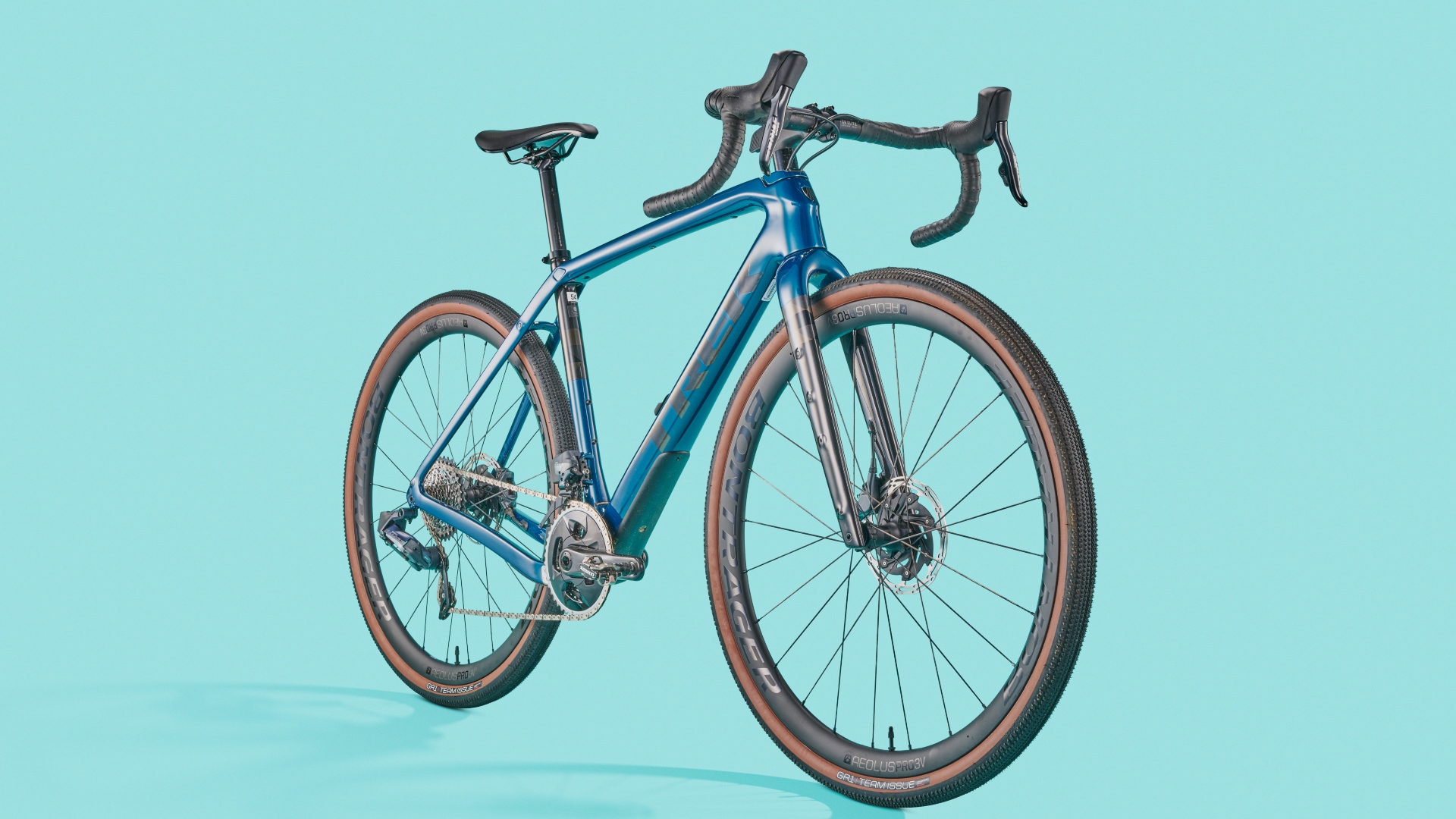
The Trek Checkpoint SL 7 is an outstanding all-rounder when it comes to all-terrain riding. A true ATV, the Checkpoint provides a planted, confidence-inspiring ride feel which is great for tackling more technical terrain. It might not be as supple as the likes of the Cannondale Topstone, but if long-distance trekking on tough terrain is your bag, the Checkpoint SL 7 is right on the money.
-
+
Planted ride feel
-
+
Compliant frameset
-
+
Handles luggage weight very well
-
+
In-frame storage is genuinely useful
-
-
Rugged ride feel won't be for everyone
You can trust Cycling Weekly.

Gravel riding is a discipline that holds a vast range of different bikes within its sphere, from gravel race bikes, to do-it-all rugged machines. Trek markets the Checkpoint SL range as its 'Adventure-focused' line, and I think they've got it spot on.
Having tested the Checkpoint SL on everything from roaming local trails to an overnight bikepacking excursion (fully laden with camping gear) I can confirm that if you are on the hunt for your next adventure gravel machine, then the Checkpoint SL 7 might just be one of the best gravel bikes on the market.
Trek Checkpoint SLR 7: Frameset
Since its last iteration which came out all the way back in 2018, Trek has given the new Checkpoint platform some serious revamping. The tubes are much chunkier now, giving the bike a much more industrial aesthetic.
Trek still includes an 'IsoSpeed decoupler' at the seat stay junction - this is a pivot system, similar to Cannondale's 'Kingpin' which allows the seat post to flex fore and aft. This, alongside a standard 27.2mm seat post, is designed to give the bike some extra compliance where the rider will feel it most. Though, I found it doesn't offer quite as much real-world travel as the Cannondale equivalent.
One big change over the last iteration is the extinction of 'Stranglehold'. The system enabled chain stay length adjustment of up to 15mm (and single speed conversion!), which meant riders could alter the geometry between a slightly more stable ride (with longer chainstays), or a more playful one (shorter chain stays).
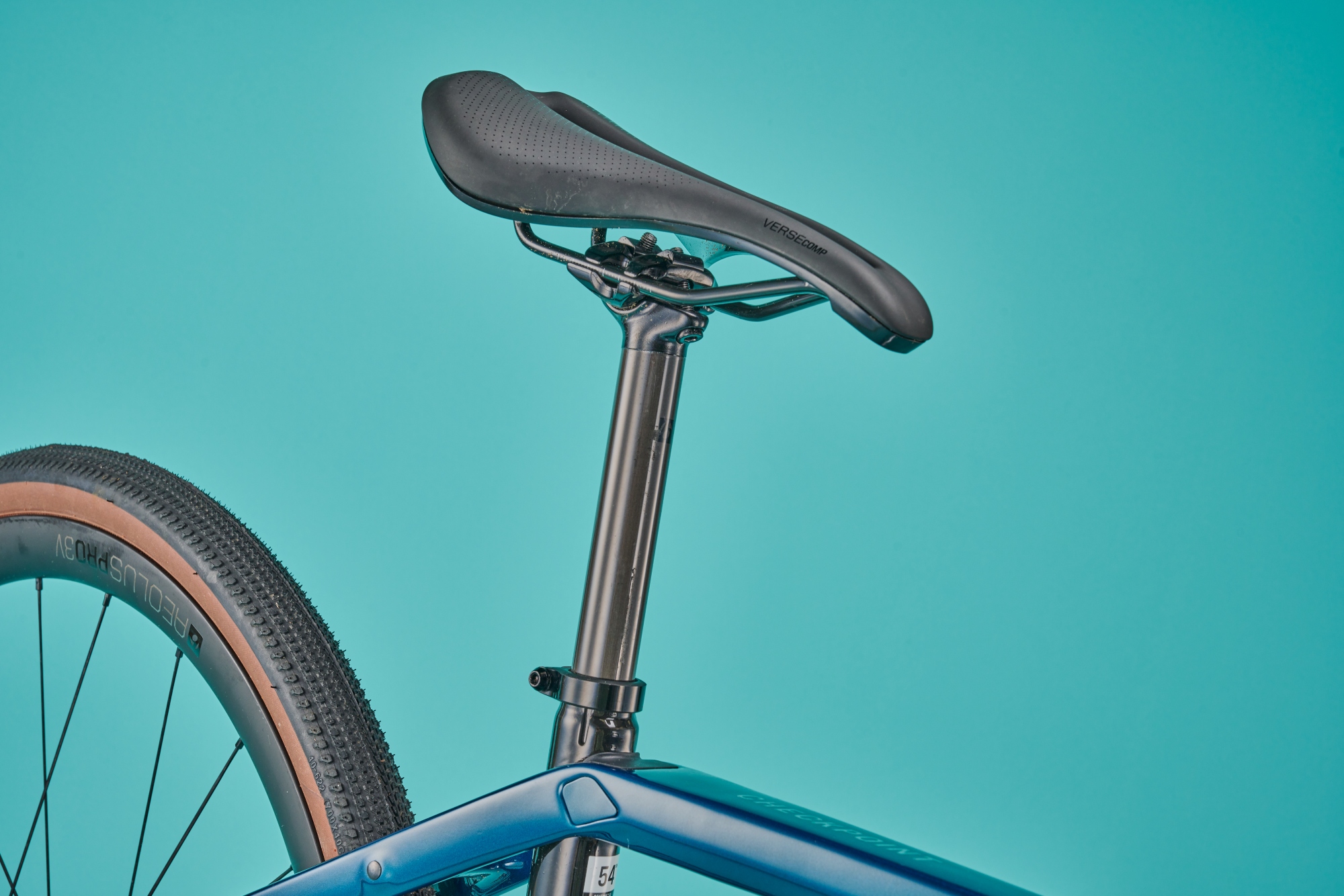
27.2mm carbon seatpost and ISO speed help compliance
Trek has opted for 435mm chainstays across all models - 10mm longer than the previous shortest setting. This does change the ride feel, which I will get onto, making for a more stable feeling rear end. Once again this characterizes the Checkpoint SL at the more adventure end of the gravel riding spectrum.
The in-frame storage is perhaps the most radical part of this bike's dedication to long-distance riding, and It works well. A section of the frame underneath the bottle cage on the downtube can be quickly released via a small lever, revealing room for a tool roll, and spares. While the 'boot capacity' is nothing overwhelming, it does provide a neat place to hide away annoying spares, like the odd tube, or smaller mini-pumps.
The latest race content, interviews, features, reviews and expert buying guides, direct to your inbox!
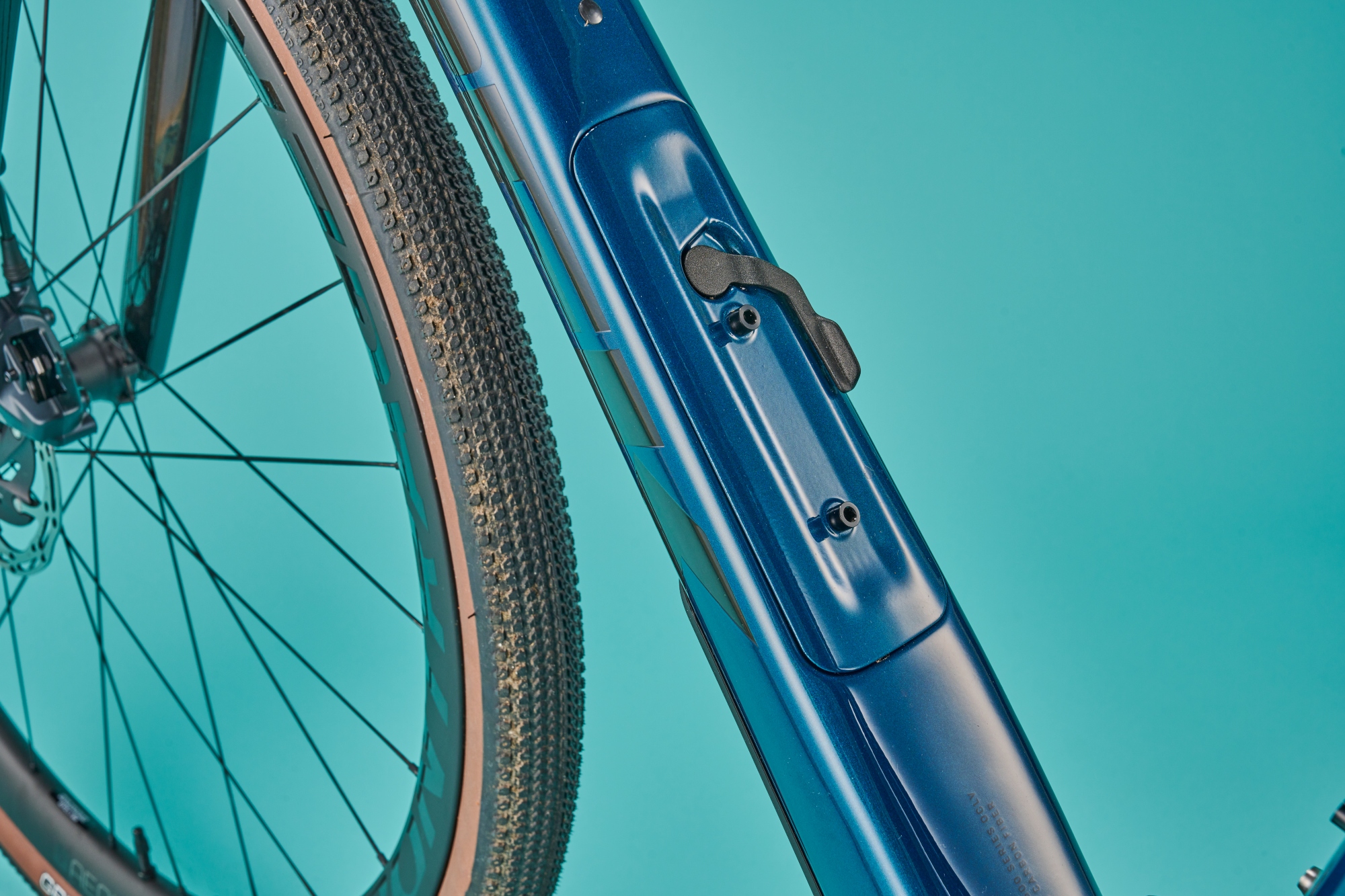
In-frame storage for tools
Trek has also included a plethora of mounting points - three bosses can be found on each fork blade, and the bike even holds the capability to mount a rear rack, which I think is a very underrated option for modern-day bikepacking, even if it isn't the most trendy. As well as these options, the usual suspects can be found with mounting points on the top tube, and underneath the down tube as well.
Notable too is the tire clearance. The new Checkpoint SL is good for 45mm tires when coupled with a 700c wheelset, but this can be upped to a 2.1 inch (53.3mm) for those who like the playful handling of a slightly smaller 650b wheelset. For the rough, and extremely varied terrain in my local testing ground, this too offered some much needed ride forgiveness.
Trek Checkpoint SLR 7: Components
The full Trek Checkpoint SL line-up spans a price range from $3,399.99 / £3,700.00 with the SL 5 to £6,400 with the SL 7, which is the model I had on test. This may be the top of the range for the 'SL' frameset, but it's worth noting with the SLR framesets, builds are priced as high as $12,249.99 / £12,000.00.
Nonetheless, the Checkpoint SL 7 still boasts some pretty high-performance parts, starting with the dependable SRAM Force AXS groupset. Trek opts for a two-by setup rather than a one-by system, which I think, for most consumers, will still be the better option.
43/30t chainrings coupled with a 10-36t cassette provide a wide range of gears, which is great news for long-distance riders, especially those who carry luggage and this never left me feeling under, or over-geared.
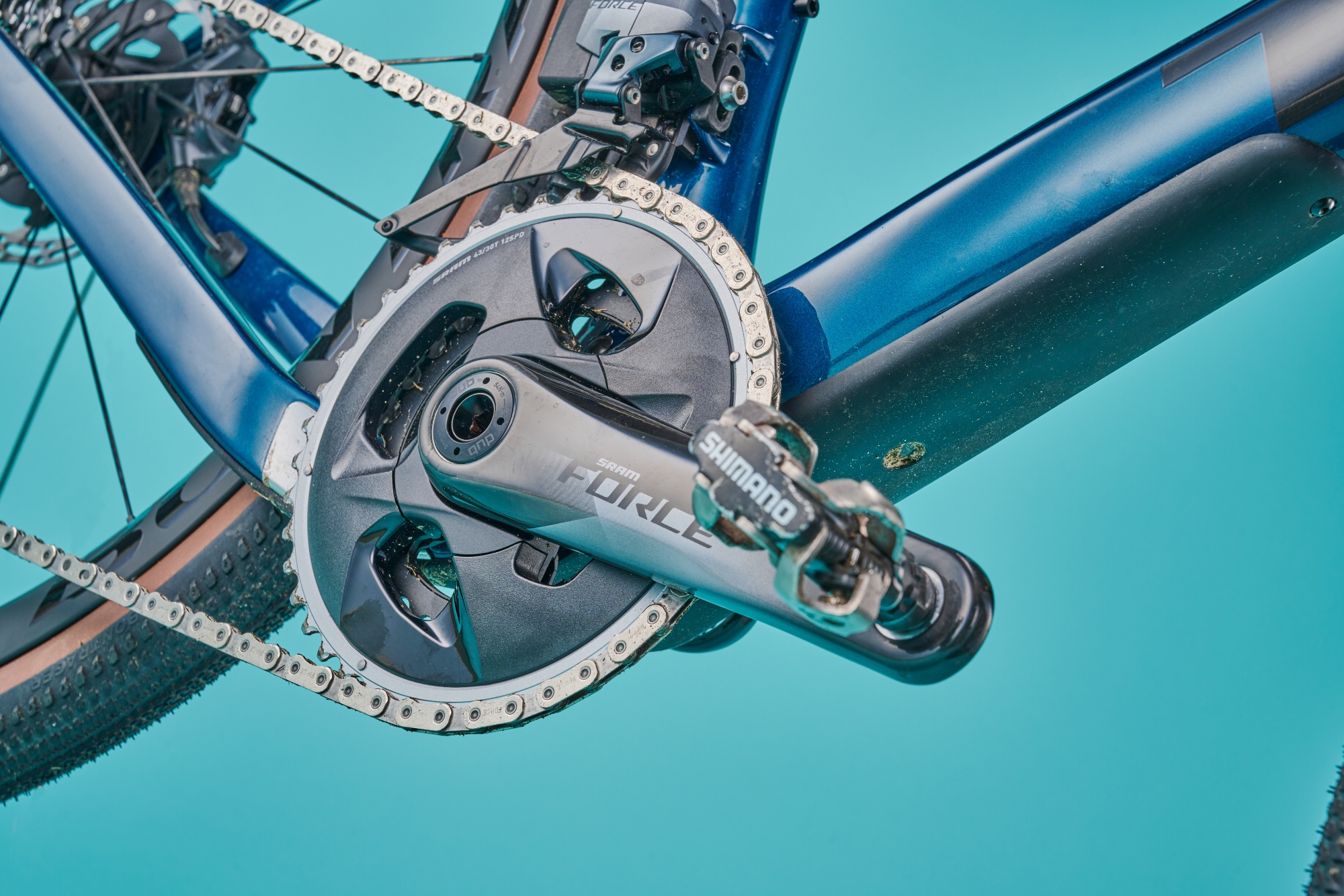
Sram Force AXS groupset throughout
The checkpoint SL 7 rolls on in-house component brand Bontrager Aeolus Pro 3V carbon wheels, which feature a 25mm internal rim width and a particularly loud freehub.
Though both the wheelset, and provided Bontrager GR1 tires are both tubeless-ready, the SL 7 comes out of the box with tubes to get started. Although I didn't set up the tires tubeless, it should be pretty easy, especially with a full Bontrager system. Bontrager provides rim strips, which snap into the Aeolus wheels, and are designed to work with Bontrager tires, meaning tight tolerances can be adhered to throughout the product range.
The finishing kit is a fairly standard affair, which can leave a little to be desired from a price standpoint, but then again it should be fairly robust. You do get Bontrager's carbon 27.2mm seat post, but both bars and stem are an alloy affair, with the 54cm frame on test coming stock with 420mm (center to center) bars, which are slightly flared, and a -7 degree 80mm stem.
Trek Checkpoint SLR 7: The ride
As I mentioned all the way back in the intro, this bike got a jolly good reviewing. With gravel bikes often marketed as the 'do-it-all' bike option, I always see fit to test gravel bikes on a whole host of terrain.
I treated the Checkpoint no different, treating it to a heap of different obstacles. My first ride was a shorter blast around a local test loop, which encounters everything from fire road to steep single track and even some small jumps. This loop allows me to gain a pretty good tell on a bike's character from the off, and it is fair to say the Checkpoint certainly lies at the more stable end of the spectrum.
The Checkpoint handled all the terrain perfectly well, but offered a more straightforward ride characteristic when compared with a more flamboyant handling bike like the Cannondale Topstone Carbon 3. For those who like a more dependable ride, this will be great news, but as someone whose riding is catered to a more playful experience, the Checkpoint wasn't quite so up my street.
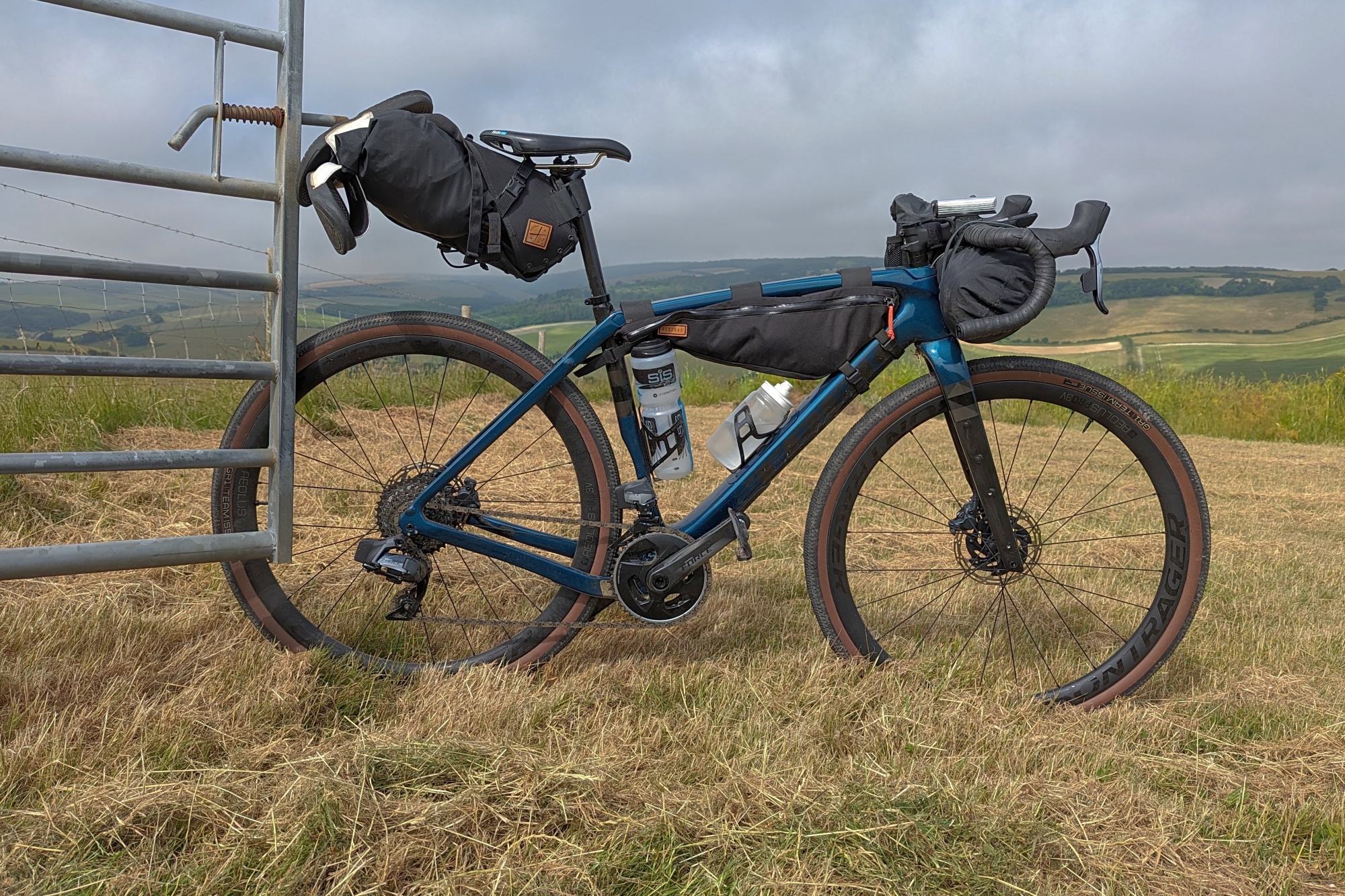
Bikepacking setup for a real test
Longer rides, and in particular, bikepacking, is where this gravel machine truly comes alive. I took the SL 7 on a (shortened due to illness) one-night trip around the Isle of Wight during testing, and this really allowed me to get to grips with the bike when fully burdened with all the equipment needed for a rough night's sleep away from home.
The bike remained totally balanced even when loaded up with a saddle pack, frame bag, and bar bag. The in-frame storage too was super useful - as previously mentioned it might not be a huge amount of real estate, but in practice, I found it was just enough to stop me from sacrificing a heavier base layer as I was able to stow away multi-tool, mini-pump, and a tube all in the tool roll. At 8.9kg too, this does make a great bikepacking platform, being rugged whilst not carrying excess weight.
When it came to the steep ups and downs synoptical with the Isle of Wight, the Trek did not falter - in the same breath however, it did not blow me away. While the chunky tubing provides great power transfer and a truly robust feeling ride, I found the ride quality to lack the excitement of other gravel bikes I have tested. The best comparison is the Cannondale Topstone Carbon 3, which, though a heavier bike, at 9.22kg, actually feels lighter and more supple than the Checkpoint.
That said I did feel like I could throw the bike at absolutely anything, loaded up with gear or not, especially with the slightly flared bars, which offered great control.
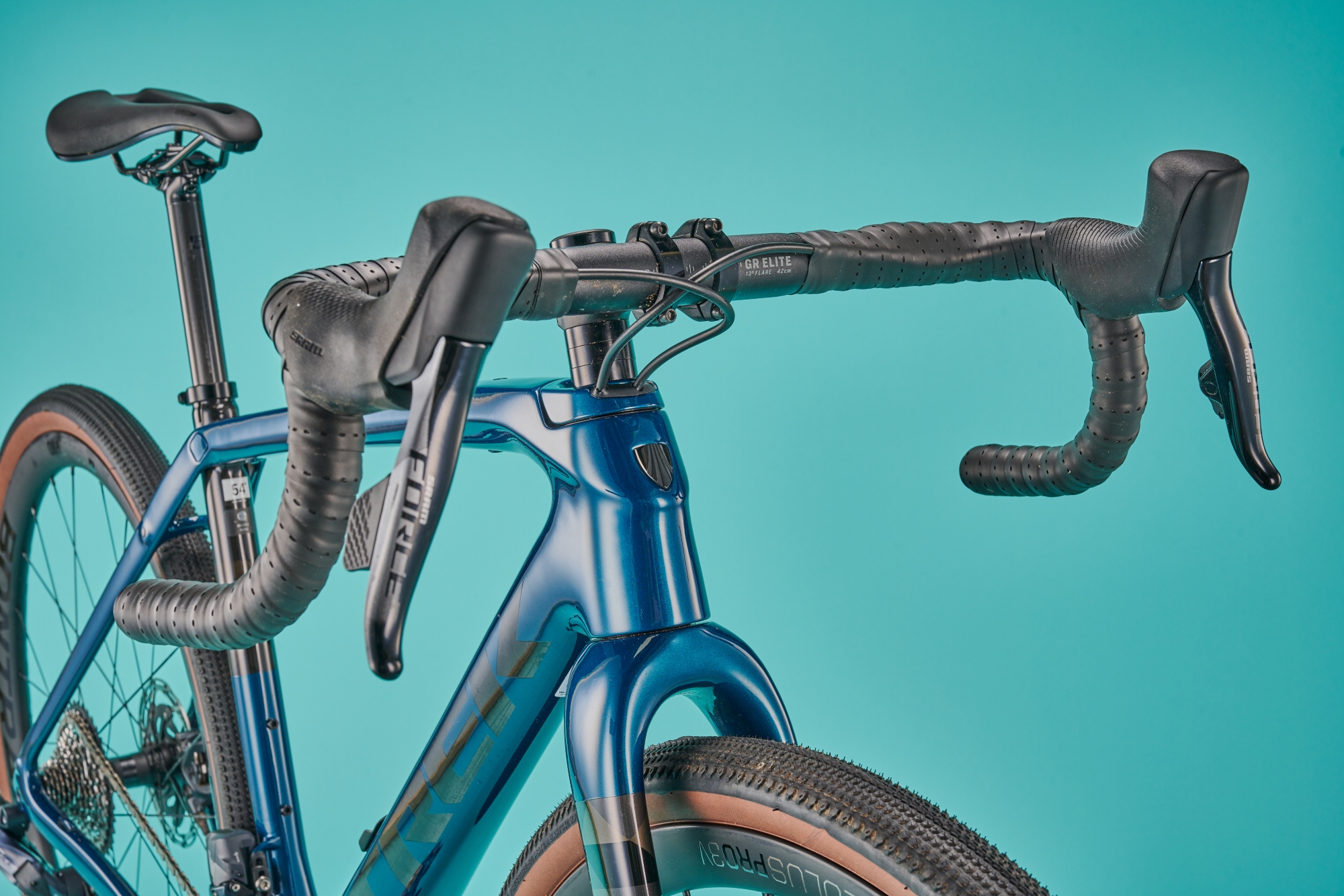
Tire clearance of up to 45mm
For me, this comes down to geometry, and it is a double-edged sword. The Checkpoint, with longer chain stays than many of the best gravel bike contenders, is undoubtedly a more stable and planted ride - and some consumers will love the imposing ride feel this brings, but for others who favor a more supple ride quality, it might not be the bike for you.
It is important to note though, this is not a criticism, much more a characterization of the bike. As gravel riding spans such a wide spectrum, it is essential to consider what riding you prioritize, and what characteristics you want out of a gravel bike.
Trek Checkpoint SLR 7: Value and conclusion
Value aside, the Trek Checkpoint SL 7 is probably the best gravel bike I have ever tested when it comes to bikepacking. An unbeatable ride feel, especially when loaded, made for super easy riding on any sort of terrain, even when tiredness loomed heavy at the end of long days of riding. We tested 9 off-road machines to crown our gravel bike of the year, with the Trek Checkpoint SL 7 winning our 'best expedition bike' title.
Include value too ($6,699.99 / £6,400.00 for the SL 7 we tested), and I think Trek is still on the money, but equally not groundbreaking. The most obvious competitor to the do-it-all Checkpoint is the Specialized Diverge Expert Carbon, which retails for a very similar $6,200.00 / £6,500.00. For a similar price, specialized matches the spec pretty much to every dotted T, also featuring carbon wheels, a second-tier SRAM AXS groupset (albeit one-by SRAM GX AXS), and alloy finishing kit.
There are certainly better value bikes out there though - the Giant Revolt Advanced Pro 1 for example, which won our overall best gravel bike of the year retails for $5,500.00 / £4,899.00, which is considerably more palatable than the SL 7. You do only get SRAM Rival AXS at this price point, and it doesn't feature the same number of mounting points if out-and-out exploration is what you are looking for, but it is still worth considering.
Trek Checkpoint SLR 7: Specs
| Frame | 500 Series OCLV Carbon, IsoSpeed, internal cable routing, downtube storage door, 3S chain keeper, T47 BB, rack and mudguard mounts, integrated frame bag mounts, flat-mount disc, dropper post compatible, 142x12 mm thru axle |
| Fork | Trek Checkpoint, full carbon, tapered carbon steerer, rack mounts, fender mounts, flat mount disc, 12x100mm thru axle |
| Wheelset | Bontrager Aeolus Pro 3V, OCLV Carbon, Tubeless Ready, 25 mm rim width, 100x12 mm thru axle |
| Groupset | SRAM Force eTap AXS, 12-speed (chainset 43/30, Cassette 10-36) |
| Handlebars | Bontrager Elite Gravel, 42 cm width |
| Stem | Bontrager Pro, 31.8 mm, Blendr-compatible, 7-degree, 80 mm length |
| Saddle | Bontrager Verse Comp, steel rails, 145 mm width |
| Bottom bracket | SRAM DUB, T47 threaded, internal bearing |
| Tyres | Bontrager GR1 Team Issue, Tubeless Ready, Inner Strength casing, aramid bead, 120 tpi, 700 x 40 c |
| Weight | 8.90 kg |
| Row 10 - Cell 0 | Row 10 - Cell 1 |
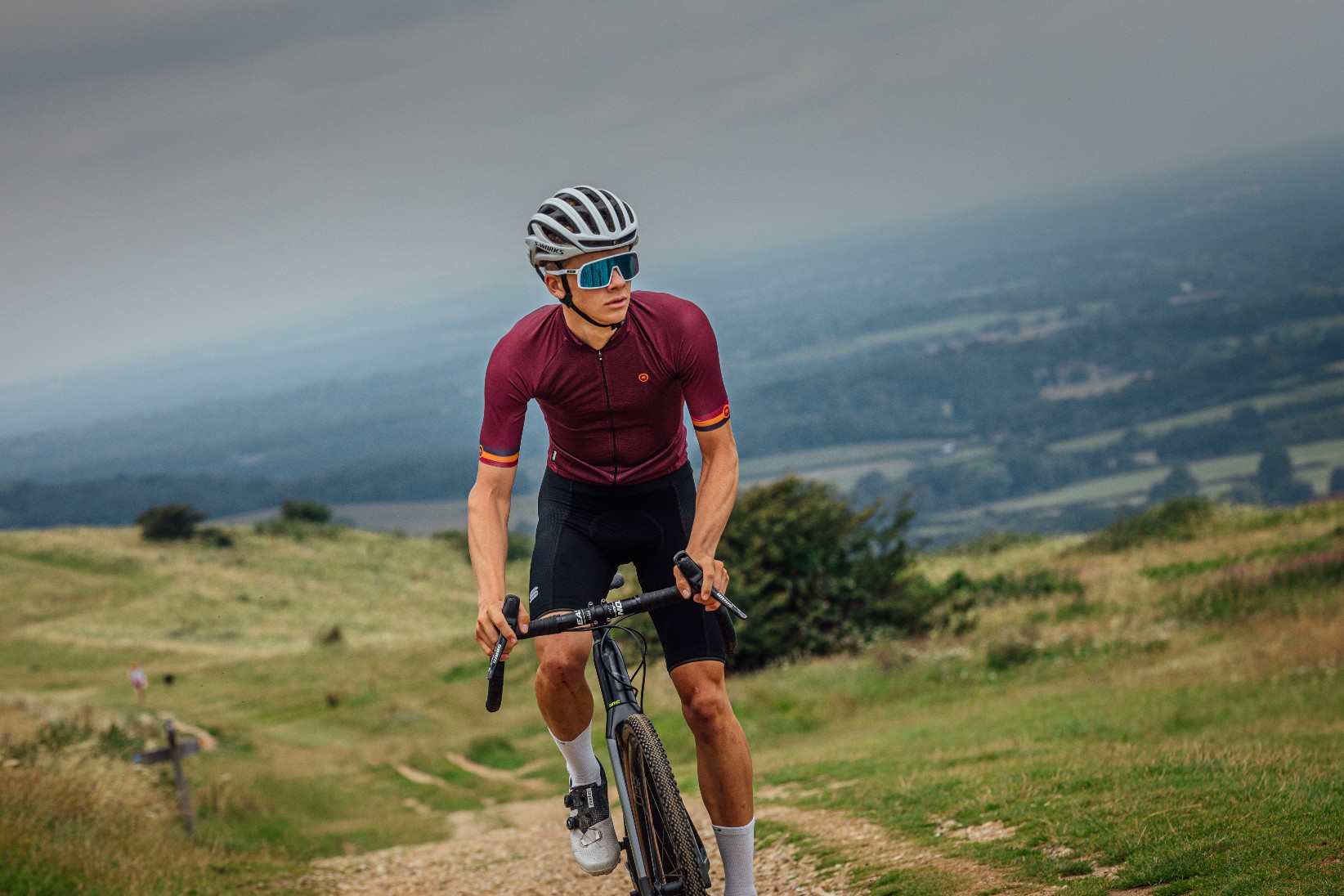
Joe is Cycling Weekly's former tech writer. He's always had a love for bikes, since first riding a two wheeled steed before the age of four. Years down the line, Joe began racing at 16, and enjoyed great experiences internationally, racing in Italy, Spain and Belgium to name a few locations. Always interested in tech, Joe even piloted his Frankenstein hill climb bike to a Junior National Title in 2018. After taking a step back from elite level racing in April 2022, Joe joined our team as a freelancer, before becoming Tech Writer in May 2023.